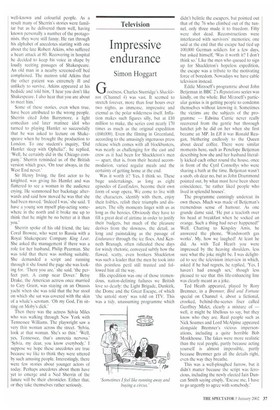Impressive endurance
Simon Hoggart
Goodness, Charles Sturridge's Shackleton (Channel 4) was vast. It seemed to stretch forever, more than four hours over two nights, as immense, impressive and eternal as the polar wilderness itself. Inflation makes such figures silly, but at £10 million to make, the series cost nearly 170 times as much as the original expedition (£60,000). Even the filming in Greenland, according to the amusingly ingenuous press release which comes with all blockbusters, was nearly as challenging for the cast and crew as it had been for Shackleton's men — apart, that is, from their heated accommodation, varied regular meals and the certainty of getting home at the end.
Was it worth it? Yes, I think so. These huge undertakings, as long as eight episodes of EastEnders, become their own form of soap opera. We come to live with the characters, identify with them, enjoy their foibles, relish their triumphs and disasters. The silly moments linger with us as long as the heroics. Obviously they have to fill a great deal of airtime in order to justify their budgets, but much of the pleasure derives from the slowness, the detail, as long and painstaking as the passage of Endurance through the ice floes. And Kenneth Branagh, often ridiculed these days for windy rhetoric, conveyed subtly how the flawed, scatty, even bankers Shackleton was such a leader that the men he took into this pointless peril still trusted and followed him all the way.
His expedition was one of those tremendous, nation-defining failures we British love so dearly: the Light Brigade, Dunkirk, the Dome and the Great Escape, of which 'the untold story' was told on ITV. This was a tidy, unassuming programme which didn't belittle the escapers, but pointed out that of the 76 who climbed out of the tunnel, only three made it to freedom. Fifty were shot dead. Reconstructions were interleaved with survivors' memories; one said at the end that the escape had tied up 100,000 German soldiers for a few days, but asked himself, 'Was it worth it? I don't think so.' Like the men who queued to sign up for Shackleton's hopeless expedition, the escape was a tribute to the motivating force of boredom. Nowadays we have cable television instead.
Eddie Mirzoeffs programme about John Betjeman in BBC 2's Reputations series was kindly, on the whole. But Mirzoeff's particular genius is in getting people to condemn themselves without knowing it. Sometimes the victims are the subjects of the pro gramme Edwina Currie never really recovered from the gentle but thorough hatchet job he did on her when she first became an MP. In ER it was Ronald Reagan, blethering endlessly to the Queen about decaf coffee. There were similar moments here, such as Penelope Betjeman describing how she and her husband literally kicked each other round the house, once in front of the Cyril Connollys who were sharing a bath at the time. Betjeman wasn't a snob, oh dear no, but as John Drummond pointed out, by what must have been sheer coincidence, 'he rather liked people who lived in splendid houses'.
The programme cunningly undercut its own theses. Much was made of Betjeman's tremendous sense of humour. As one grande dame said, 'He put a teacloth over his head at breakfast when he socked an orange. Such a thing had never happened!' Well. Chatting to Kingsley Amis, he answered the phone, 'Wandsworth gas works'. My, how we laughed! At least he did. As with Ted Heath you were impressed by the heaving shoulders, less sure what the joke might be. I was delighted to see the television interview in which, asked if he had regrets, he replied, 'Yes, I haven't had enough sex,' though less pleased to see that this life-enhancing line was clearly meant as a joke.
Ted Heath appeared, played by Rory Bremner, in a Bremner, Bird and Fortune special on Channel 4, about a fictional, crooked, behind-the-scenes fixer called Geoffrey Malet, clearly a mixture of — well, it might be libellous to say, but they know who they are. Real people such as Nick Soarnes and Lord McAlpine appeared alongside Bremner's vicious impersonations, including a quite horrible Bob Monkhouse. The fakes were more realistic than the real people, partly because acting yourself is almost impossible, partly because Bremner gets all the details right, even the way they breathe.
This was a well-ploughed furrow, but it didn't matter because the script was ferocious, including the newly elected lain Duncan Smith saying crisply, 'Excuse me, I have to go urgently to agree with somebody.'






















































 Previous page
Previous page